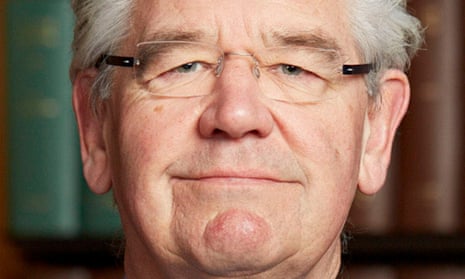The government is dismantling the UK’s “precious system of legal aid”, placing access to justice under threat, a senior supreme court judge has said in a forthright speech in Chicago.
Lord Wilson, who has sat on the UK’s highest court since 2011, also said “insularity” was one of the main features of human rights practice in the US, and implied that the Trump administration’s withdrawal from the UN human rights council set “a useful precedent for repressive leaders around the world”.
The judge, who specialised in family law before joining the supreme court, described the UK’s own Human Rights Act as “brilliant”, although he admitted that a few recent judgments delivered by the European court of human rights in Strasbourg “stick in the throat”.
Wilson’s comments continue an unacknowledged tradition of supreme court justices delivering their most outspoken views at law conferences overseas.
Delivered to the law school at Northwestern University in Chicago on Tuesday, Wilson’s speech, titled Our Human Rights: A Joint Effort?, addressed some of the most sensitive issues where law and politics intersect.
“In pursuit of its economic policy the UK government has recently felt the need to dismantle much of our precious system of legal aid, introduced in 1949 along with the other two pillars of our welfare state, namely social security and the National Health Service,” Wilson explained.
The disadvantaged who needed to be acquainted with their human rights and helped to enforce them were unlikely to be able to do so without free legal advice and representation, he said.
“Even where it is required to continue to provide free legal aid, for example to defendants to criminal charges and to parents threatened with the removal of their children, the UK is dismantling it indirectly by setting rates of remuneration for the lawyers at levels so uncommercial that, reluctantly, most of them feel unable to do that work. Access to justice is under threat in the UK.”
Wilson said the UK’s lower courts were full of litigants who had to represent themselves, often “very ineptly”. Able advocates still regularly appeared, “but, particularly when they are asserting human rights against a public authority, they nobly appear pro bono, or for a small fee under the attenuated legal aid scheme; and it constantly offends me that it should be necessary for them to do so.”
Turning to the Human Rights Act, he said: “I regard it as brilliant.” He continued: “I personally respect the [European court of human rights in Strasbourg, which interprets and enforces the European convention on human rights] and have no difficulty in following almost all of its decisions. Occasionally, however, they stick in the throat.” Several ECHR decisions on Iraq were the product of an “extravagant mood”, he said.
But there had been a “groundswell of objection in the UK to human rights in general, and to the jurisdiction of the Strasbourg court in particular, whipped up by a powerful populist press,” particularly in relation to cases revolving around the right under article 8 of the convention to respect for one’s personal and family life.
“I have often been assailed about the absurdity of [cases relating to deportation of foreign criminals], usually on the curious basis that it was all my fault,” Wilson said. Recent judgments by the supreme court and changes to the law had “tipped the balance against the success of most claims of that sort”, he added.
In relation to US law, Wilson said: “What most strikes the affectionate onlooker about American human rights is their insularity. The horrors of the 20th century demanded an international response, in which, ever since it declined to join the League of Nations and later expressed its distaste for Mrs Roosevelt’s declaration, your country has been a most reluctant participant.”
Only three months ago, Wilson said, “the US withdrew from the UN human rights council following the high commissioner’s denunciation of the family separation policy … By thus bailing out of the council, has not your country, of all countries, set a useful precedent for repressive leaders around the world?
“So American rejection of foreign treaties, indeed of foreign influence, is nothing new. In one way it shows an enviable degree of national self-confidence. In relation to human rights, the rejection of dialogue with the international community is justified on the basis that the American people haven’t authorised it even indirectly. Is this invocation of democratic principle a substantial argument? Or is it a figleaf?”










